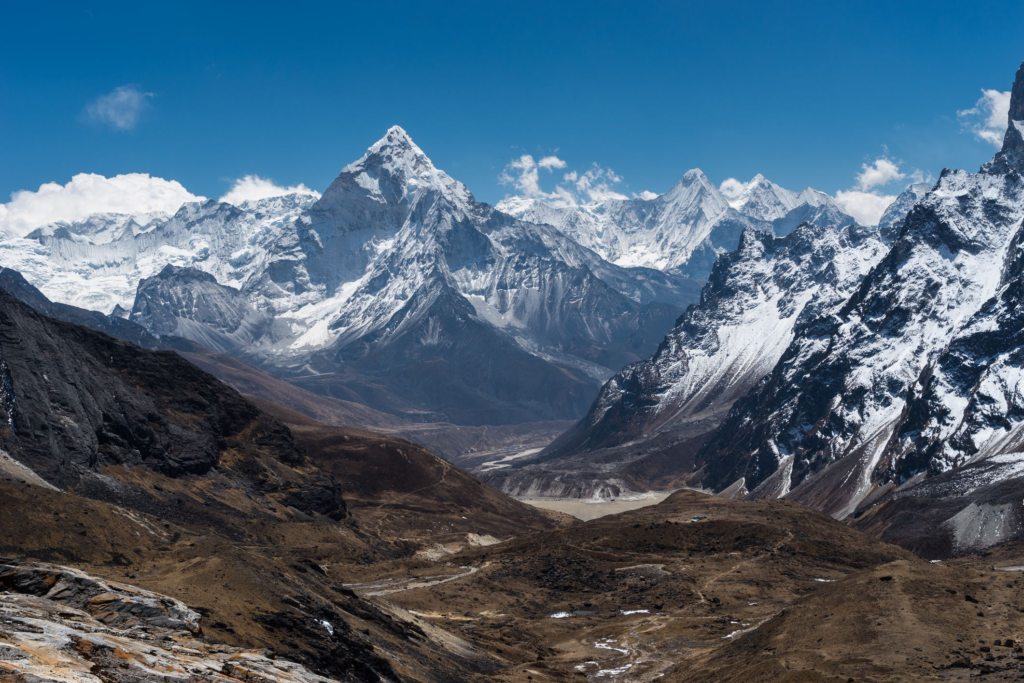Why Mountains Matter: Celebrating International Mountain Day

Every year on December 11th, we celebrate International Mountain Day—a day dedicated to raising awareness about the importance of mountains in our lives. From their towering peaks to their vibrant ecosystems, mountains are not just majestic landscapes; they are vital to the health of our planet and the well-being of millions of people worldwide. Let’s explore why mountains matter and some amazing facts about these natural wonders.
Importance of Mountains
- Water Towers of the World Mountains are often referred to as the “water towers of the world” because they provide freshwater to nearly half of humanity. Glaciers, snow, and rainfall in mountain regions feed rivers and lakes, supporting agriculture, drinking water supplies, and hydropower.
- Biodiversity Hotspots Mountains are home to a rich diversity of flora and fauna, many of which are found nowhere else on Earth. Their unique ecosystems play a critical role in maintaining global biodiversity.
- Climate Regulation Mountain forests act as carbon sinks, helping to regulate the Earth’s climate. They also influence weather patterns and act as barriers to wind and moisture.
- Cultural Significance For centuries, mountains have been revered in various cultures and religions. They inspire art, literature, and spiritual practices, serving as symbols of strength and resilience.
- Livelihoods Over a billion people live in mountain regions, depending on them for farming, forestry, and tourism. Mountains are also essential for generating income through activities like trekking and skiing.
Amazing Facts About Mountains
- Tallest Mountain: Mount Everest, in the Himalayas, at 8,848.86 meters (29,031.7 feet), is the tallest mountain above sea level. However, if measured from base to summit, Mauna Kea in Hawaii is taller (10,210 meters).
- Young and Old Mountains: The Himalayas are among the youngest mountain ranges, formed about 50 million years ago. The Appalachians in North America are some of the oldest, over 300 million years old.
- Volcanic Mountains: Many mountains, like Mount Fuji and Kilimanjaro, are volcanoes. The Ring of Fire is a hotbed of volcanic mountain formation.
- Altitude Challenges: The human body struggles at high altitudes due to lower oxygen levels, often leading to altitude sickness. Despite this, over 5,000 climbers have summited Mount Everest.
- Mountain Life: Around 90% of mountain dwellers live in developing countries, where conditions can be harsh and access to resources limited. The alpaca and yak are examples of animals adapted to mountain living, providing sustenance and transportation.
- Longest Mountain Range: The Andes, stretching over 7,000 kilometers (4,350 miles), is the longest mountain range above sea level.
- Underwater Mountains: The mid-ocean ridge is the world’s longest mountain range, but most of it lies underwater, extending over 65,000 kilometers (40,389 miles).
- Sacred Peaks: Mount Kailash in Tibet is considered sacred in Hinduism, Buddhism, Jainism, and Bon.
- Volcanic Giants: Mauna Kea in Hawaii, though only 4,207 meters (13,803 feet) above sea level, is the tallest mountain when measured from its base underwater—reaching over 10,000 meters (33,500 feet).

How You Can Help Protect Mountains
- Sustainable Tourism: When visiting mountain regions, opt for eco-friendly accommodations and activities. Respect local cultures and minimize your environmental footprint.
- Support Conservation Efforts: Donate to or volunteer with organizations that work to preserve mountain ecosystems.
- Reduce Your Carbon Footprint: Climate change poses a significant threat to mountain glaciers and biodiversity. Use energy-efficient practices to reduce greenhouse gas emissions.
- Spread Awareness: Use International Mountain Day as an opportunity to educate others about the importance of mountains.
Importance of International Mountain Day
- Awareness and Action: Highlights the challenges faced by mountain communities, such as climate change, poverty, and resource depletion.
- Sustainable Development: Encourages sustainable tourism and farming practices in mountain regions.
- Global Collaboration: Brings attention to the need for preserving mountain ecosystems for future generations.
Conclusion
Mountains are more than just breathtaking landscapes; they are indispensable to our planet’s ecosystem and human livelihoods. This International Mountain Day, take a moment to appreciate these natural wonders and commit to their preservation. Together, we can ensure that mountains continue to thrive for generations to come.

Thank you for joining Prachi The Tatwa Girl. 🌿Read on various Panch Tatwa topics by #TheTatwaGirl.
Agni—The Fire Tatwa— I write about food under this element. Inspired by its energy and life force, I share special recipes and culinary creations.
Vayu – The Air Tatwa – In this element, I write about things around us, the cultures and festivals being celebrated. Traditions followed and mythology and beliefs of a particular place.
Aakash—The Sky Tatwa—I write about my travel experiences here, describing the infinite skies and towering mountain peaks I encounter during my journeys.
Jal – The Water Tatwa – Here, I express my inner emotions, just like the flowing and ever-moving water. This is a reflection of the continuous flow of my thoughts.
Prithvi—The Earth Tatwa— Earth element, I focus on environmental issues and eco-friendly lifestyle solutions. This includes ways to live in harmony with our planet. In today’s world, sustainable development has become a necessity.
Don’t miss the Green Tatwa Talks podcast, and explore eco-friendly, sustainable living practices from awesome Green warriors I have interviewed, who work towards protecting the environment and bringing about positive change.
Subscribe on LinkedIn and get EcoFriendly with Prachi.
Follow The Tatwa Girl
Check PragunTatwa Feed
Visit my nature stories feed on my Instagram Feed, For more Eco-Friendly content.
Did you hug a tree today? Check my Tree Love posts and learn more about the Trees around us.








Recent Comments